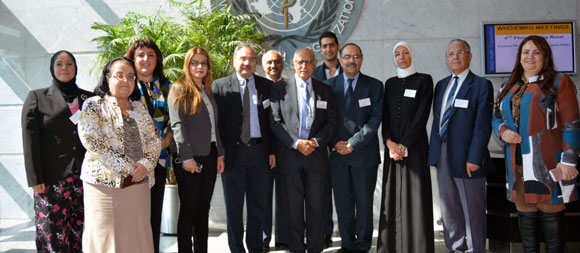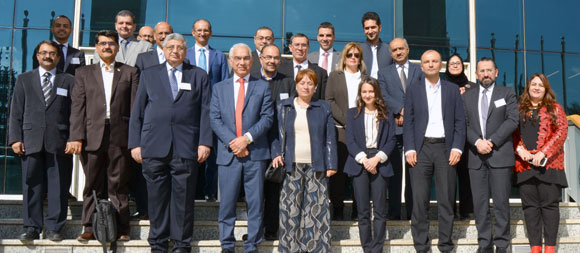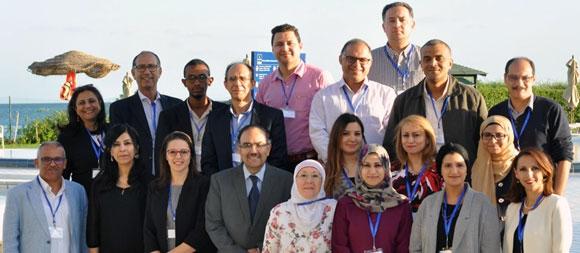
Information, Evidence and Research

Research Promotion Newsletter
January 2018
» Meetings

Meeting of the Eastern Mediterranean Research Review Ethics Review Committee
November 2017 – The Research Ethics Review Committee held its annual meeting from 22 to 23 October, 2017 to review the Committee’s work during the period of the Programme Budget 2016–2017; finalize checklists (for reviewers, investigators); agree on modalities for taking forward recommendations of recent meetings; and plan future work in light of the Programme Budget 2018–2019.

Expert consultation: fostering institutional and structural capacity for evidence-based health policy-making
November 2017 – The goal of this consultation was to strengthen national institutional capacity in ministries of health in the Region by discussing global/regional mechanisms for the translation of knowledge; incorporating research evidence into health-policy making; discussing national perspectives of structural approaches to enhance formal institutionalization of research evidence in national policy-making for health, and identifying effective and innovative approaches for bridging the gap between researchers and policy-makers.
» Research grants

» Investment in research: WHO-funded research generates new evidence
Access to and use of long-lasting insecticidal nets and factors associated with non-use among communities in malaria-endemic areas of Al Hudaydah governorate in Tihama region, west of YemenThis project received funding from WHO’s Tropical Disease Research - Small Grant Scheme. The research was conducted by a health research group from Sana'a University, Yemen.
» Read the outcomes of this study
Prevalence of glucose-6-phosphate dehydrogenase (G6PD) deficiency in the malaria-endemic region of Iran (Sistan and Baluchestan Province): epidemiological profile and trends over time
This project received funding from WHO’s Tropical Disease Research - Small Grant Scheme. The research was conducted by researchers from Health Promotion Research Center, Zahedan University of Medical Sciences, Zahedan, Islamic Republic of Iran.
» Capacity-building

UNESCO-WHO national workshop on ethics teaching and research ethics, Damascus, Syria
August 2017 - A 4-day national training workshop was held to enhance the capacity of Syrian university professors engaged in bioethics teaching and research ethics through introducing tools produced by UNESCO and WHO. The workshop focused on bioethics teaching and UNESCO tools in this regard, research ethics in general, and the use of training tools on ethics during emergencies and humanitarian settings.
Supporting development of the Research Office at the National Center for Disease Control, Tripoli, Libya
September 2017 – Following the visit of the delegation from the National Center for Diseases Control in Libya to discuss needed assistance to establish a NCDC Research Unit, a 2-day workshop was conducted with the support of the WHO Office of Libya temporarily located in Tunis to draft a workplan for establishing a research office at the Centre; plan for performing national situation analysis/setting priorities for health research; and prepare for establishing Research Ethics Review Committee linked with research office.
Regional capacity-building in tropical disease implementation research, Hammamet, Tunisia
October 2017 – A workshop was conducted from 25 to 27 October 2017 in Hammamet, Tunisia, aimed at: introducing tropical implementation research concepts; understanding different study designs for specific TDR topics under community settings; applying basic statistical analytical techniques, interpretation and presentation of results; understanding and observing ethical principles in conduct of research on human subjects; and preparing a plan for actively disseminating and fostering the utilization of the research outcomes/generated evidence for policy-makers.
SDL-RPD workshop on health research methods and ethics, Cairo, Egypt
December 2017 – In collaboration with the Staff Development and Learning Programme, a workshop was conducted from 5 to 6 December 2017 to: introduce basic concepts and methods central to conduct of health research; discuss ethical principles in conducting research involving human subjects; and emphasize the importance and utility of translating research evidence into practice.
Regional capacity-building in good health research practice
December 2017 –The TDR Special Programme, in collaboration with academic and research institutions, has developed a training programme entitled “Good Health Research Practice”. The aim of the course is to impart knowledge and skills for the application of ethical and quality principles in the design, conduct, recording and reporting of health research in humans. In this regard, a course was conducted from 22 to 25 December 2017 in Hammamet, Tunisia. The workshop included 38 participants from 12 countries. Workshop facilitators were from the Pasteur Institute of Tunis, the WHO Regional Office for the Eastern Mediterranean, and Baghdad University.
» Important announcements

Supporting systematic use of research evidence from qualitative studies in decision-making and guideline development: applying GRADE-CERQual to qualitative evidence synthesis findings - A new series of papers
As a result of collaborative work between WHO and several academic institutions, an important tool has been developed to streamline use of qualitative research evidence in public health decision-making. A series of papers published in the Implementation Science journal this week provides a scientific tool for assessing how much confidence to place in findings from qualitative evidence syntheses. The tool known as CERQual (Confidence in the Evidence from Reviews of Qualitative research) has been designed to help decision- makers use qualitative evidence for decisions and policies about health care and social welfare.
Index Medicus for the Eastern Mediterranean (IMEMR) update
IMEMR was developed by the WHO Regional Office as a unique and comprehensive information resource which provides online access to peer-reviewed health and biomedical sciences journals from the Region. IMEMR includes more than 189 000 bibliographic citations from 659 peer-reviewed journals published in 20 countries.
» Access the complete database along with online access to the full text
Call for Emerging Voices for Global Health 2018 at the Fifth Global Health Symposium on Health Systems Research
Emerging Voices for Global Health (EV4GH) is an innovative multi-partner blended training programme for young, promising and emerging health policy and systems researchers, decision-makers and other health system actors with an interest to become influential global health voices and/or local change makers. EV4GH coaches “Emerging Voices” to participate actively in international conferences where global health issues are addressed and to raise their voice in scientific and policy debates.
Contact us
Research Promotion and Development Programme
Department of Information, Evidence and Research
World Health Organization
Regional Office for the Eastern Mediterranean
WHO Street, extension of:
Abdel-Razak El-Sanhouri Street
P.O.Box 7608, Nasr City (11371)
Cairo, Egypt
![]() emrgorpd@who.int
emrgorpd@who.int
![]() +202 22765348; 22765452
+202 22765348; 22765452
![]() +202 2670 2492 / +202 267 2494
+202 2670 2492 / +202 267 2494
![]() http://www.emro.who.int/research
http://www.emro.who.int/research


